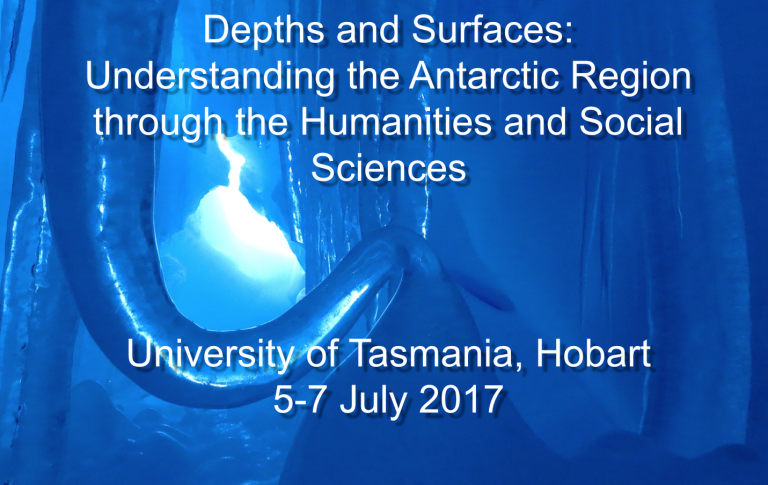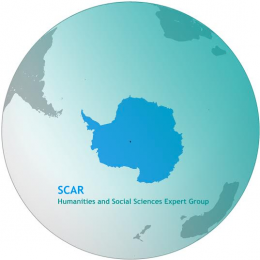The Third Joint Conference of the Humanities and Social Sciences Expert Group and the History Expert Group of the Scientific Committee on Antarctic Research (SCAR) with the theme “Depths and Surfaces: Understanding the Antarctic Region through the Humanities and Social Sciences” will be held at the Institute for Marine and Antarctic Studies (IMAS), University of Tasmania, Hobart, Australia over 5-7 July 2017.
Antarctica rarely makes it onto the map of the humanities and social sciences. While artists have produced responses to the continent for centuries, non-scientific researchers have been reluctant to venture intellectually into the far southern latitudes. The continent’s lack of an indigenous or permanent human population, together with a popular Antarctic exceptionalism which frames the continent as immune to the political, social and economic forces that affect the rest of the globe, has made it seem off-limits to analysis outside of a scientific framework. Increasingly, however, public attention is being drawn to Antarctica, as the surface of its ice plays host to tourists, proliferating stations, heroic re-enactments, and national manoeuvring; its icy depths reveal the environmental history of our planet; and its ocean currents ominously undermine the glaciers around its edges. While scientific efforts are crucial, understanding the Antarctic region – past, present and future – requires contributions across the disciplinary spectrum. This conference aims to bring together humanities, creative arts and social sciences researchers interested in the Antarctic, fostering a community of scholars who can act in concert with natural scientists to address the issues that face the Antarctic region.
Papers are invited from a broad range of disciplines – including history, literary and cultural studies, creative arts, sociology, politics, geography and law – that engage with the Antarctic, sub-Antarctic and Southern Ocean. Contributions from scientists are encouraged. Both proposals for individual papers (20 minutes with 10 minutes question time) and interdisciplinary panels are welcome. Topics may include, but are not limited to:
Antarctic texts and subtexts
Antarctic cryoscapes
Anthropocene Antarctica
Ice cores as cultural and political objects
Submerged issues in the Antarctic region
Connections and collaborations between the arts, humanities, social sciences and natural sciences (particularly oceanography and bathymetry)
History of polar science
Antarctic historiography
History and politics of the Southern Ocean
Digging into the past: archives, artefacts, archaeology
Sub-Antarctic islands: histories and cultures
Postcolonial Antarctica
Ice and identity politics
Antarctic nationalisms
Polar geographies and geopolitics
Antarctica and the global commons
Transpolar connections
Polar mobilities, vertical and horizontal
Antarctic tourism and travel
Inhabiting the ice: structures and dwellings
Polar heritage and museums
Antarctic aesthetics
Antarctica and emotions
Antarctic futures
Abstracts of up to 250 words, including a short bio note, in WORD doc format, should be emailed to antarcticassag@gmail.com by 3 March 2017, with notification of acceptance by 31 March 2017. There will be an opportunity for selected papers to be expanded into one or more publications stemming from the conference. For inquiries please contact antarcticassag@gmail.com.
Conference keynote speakers will be Sanjay Chaturvedi (Panjab University, India), Anne Noble (Massey University, New Zealand) and Tim Stephens (University of Sydney, Australia). The conference will be convened by Elizabeth Leane of the School of Humanities/IMAS, University of Tasmania.
The Antarctic Legacy of South Africa plans to attend the conference in Hobart next year.
John Cooper, Principal Investigator, Antarctic Legacy of South Africa, Department of Botany and Zoology, Stellenbosch University, 24 September 2016


